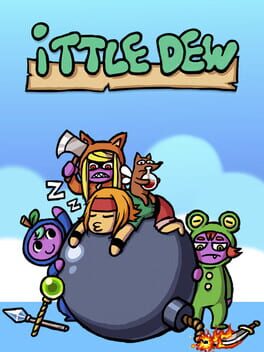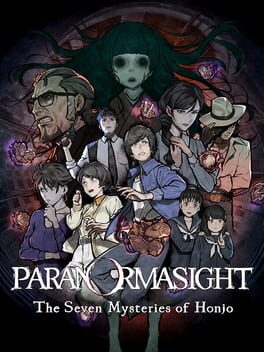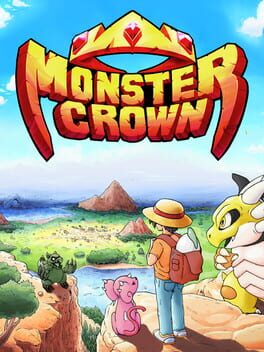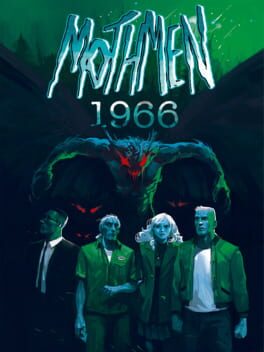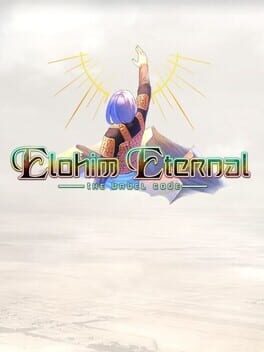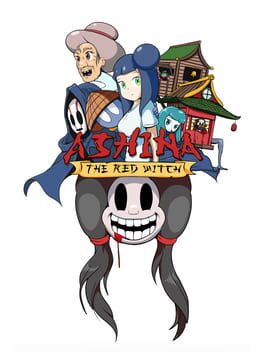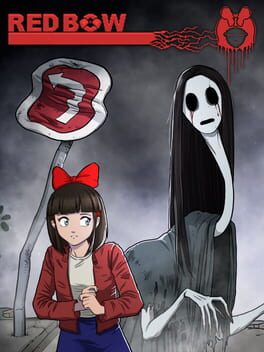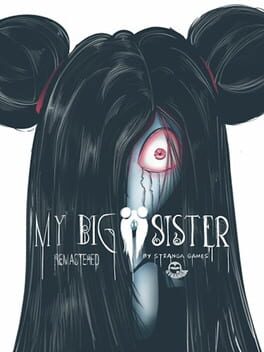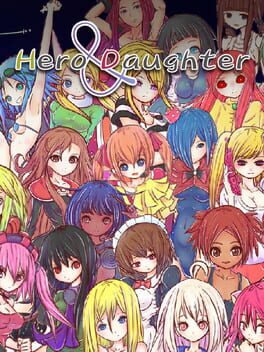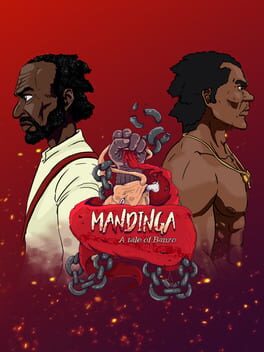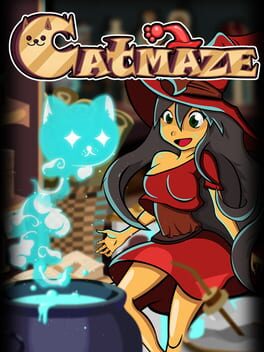jademonkey
2013
Fun little puzzle heavy Zelda-like. Most of the puzzles were sokoban style box pushing, but with some extra twists. The combat felt very clumsy, but the game never asked too much of the player and was very forgiving with healing and restarts after death, so it wasn't too frustrating. There's a lot of smirk-worthy humor throughout the game, but nothing really laugh out loud funny.
I wasn't too interested in continuing on to do the optional content, but I enjoyed the three and a half hours I spent on the main quest.
I wasn't too interested in continuing on to do the optional content, but I enjoyed the three and a half hours I spent on the main quest.
2022
There are already plenty of reviews on here talking about the artistic merit of Immortality, how good the FMV acting is, the novelty of finding new clips, etc. I mostly agree with those 5 star reviews -- there's some really cool stuff to experience here. Uncovering the plots of the three movies is very cool. The bigger picture is very cool. It's certainly a game worth experiencing.
That said, I found several key aspects of the game to hinder my experience.
The controls for watching the FMV clips somehow managed to be absolutely awful. I think the intent was to feel like your winding an unwinding actual film? I really don't know. I work in computer vision, so I spend a good amount of time scrubbing back and forth over videos. I can say with honesty that I have more fun doing it at work than I did here. The clunky controls actually almost led to me missing a key mechanic of the game and did lead to me having to rewatch a lot of video.
The mechanic for finding new videos -- clicking on something on screen to see something similar from a different clip -- is really cool at first, but it gets a bit frustrating by the end. There's some amount of randomness to the clip you end up at and no clear way to find new clips. So, as the amount of clips you've seen increases, it becomes proportionally that much more difficult to find a new clip. This was mainly an issue in the last couple of hours, but it contributed to a bit to souring the impact of the finale.
Finally, the game soft locked during the finale. What should have been an impactful, shocking, and dramatic moment instead led to 10 minutes of me confusedly wondering if I was just having issues with the controls again or if it really wouldn't continue past the point I was at. A google search and reddit post revealed that this has happened to others -- and that there was no way to retrigger the final sequence without clearing your data and starting over. I tried myself to make sure, but sure enough, no luck. So, I had to watch the last bit on youtube after that interruption.
On top of the gameplay issues, I just didn't quite connect with the thematic components of the game. As I said in the first paragraph, it was extraordinarily well done, but I think I'm just not the person to be strongly impacted by what Immortality offers. There were also a a couple of fairly basic mysteries that I wanted answers to and couldn't find one, even googling afterward.
All of the complaining aside, I'm glad I played the game and will almost certainly circle back to Sam Barlow's other games in the future.
That said, I found several key aspects of the game to hinder my experience.
The controls for watching the FMV clips somehow managed to be absolutely awful. I think the intent was to feel like your winding an unwinding actual film? I really don't know. I work in computer vision, so I spend a good amount of time scrubbing back and forth over videos. I can say with honesty that I have more fun doing it at work than I did here. The clunky controls actually almost led to me missing a key mechanic of the game and did lead to me having to rewatch a lot of video.
The mechanic for finding new videos -- clicking on something on screen to see something similar from a different clip -- is really cool at first, but it gets a bit frustrating by the end. There's some amount of randomness to the clip you end up at and no clear way to find new clips. So, as the amount of clips you've seen increases, it becomes proportionally that much more difficult to find a new clip. This was mainly an issue in the last couple of hours, but it contributed to a bit to souring the impact of the finale.
Finally, the game soft locked during the finale. What should have been an impactful, shocking, and dramatic moment instead led to 10 minutes of me confusedly wondering if I was just having issues with the controls again or if it really wouldn't continue past the point I was at. A google search and reddit post revealed that this has happened to others -- and that there was no way to retrigger the final sequence without clearing your data and starting over. I tried myself to make sure, but sure enough, no luck. So, I had to watch the last bit on youtube after that interruption.
On top of the gameplay issues, I just didn't quite connect with the thematic components of the game. As I said in the first paragraph, it was extraordinarily well done, but I think I'm just not the person to be strongly impacted by what Immortality offers. There were also a a couple of fairly basic mysteries that I wanted answers to and couldn't find one, even googling afterward.
All of the complaining aside, I'm glad I played the game and will almost certainly circle back to Sam Barlow's other games in the future.
I absolutely loved my time with Paranormasight. It deserves the effort of a well structured review, but I'm not feeling motivated at the moment, so I'm just going to write.
Paranormasight is more of a supernatural mystery visual novel than horror as it bills itself. There are certainly horror elements, but the mystery is the focus and it's done extremely well. There was never a moment that I felt like something just came out of left field -- there were surprises, but they always made sense in the end. It was an excellently thought-out and written storyline.
I think the characters may have been the highlight here, even with the overall narrative and mystery being so well done. The diversity was nice -- from your standard anime high schoolers, to mid-20s, a mid 30s mother, a detective in his 50s, and so on. I found that they all behaved believably... well, unless there was a supernatural reason for them not to. The backstories and motivations were solid for each, and humor was used fairly liberally and effectively in character building moments.
The art and music were great. The creepy atmospheric tracks were spot on, the more dramatic choir themes were excellent, and I very much enjoyed the somewhat goofy jazz theme that would accompany a pair of detectives in the less dire moments. The character designs and expressions were top notch, and I enjoyed the scenery as I searched each of the games locations for the (optional) collectible Mocking Bird stickers -- which included such greats as a penguin with a pompadour and an eagle with a mohawk and biker jacket.
In the 13 hours it took me to reach the true ending, there was only one point that I found a puzzle to be annoying. It required advancing a completely unrelated and fairly easy to miss conversation in a different scene altogether. I generally made sure to exhaust all conversation options, so it was mainly bad luck that I missed this one and couldn't figure out how to proceed for a bit. Still, there was no indication of what I needed to do other than a brute force search. That said, all of the other puzzles were well done and required a bit of clever thinking. There are some meta elements to some of the puzzles that I found well done and enjoyable to figure out.
There's a couple of other quick things to mention. While the game features multiple endings, it is essentially a linear affair -- there's no real branching to be had here. Perfectly fine with me, but I know that's not everyone's cup of tea. Also, as mentioned above the horror elements are fairly light. If you want to be frightened, this isn't the game. Again, that's actually to my preference -- I love games that have a horror flavor without actually messing up my sleep haha.
Paranormasight is more of a supernatural mystery visual novel than horror as it bills itself. There are certainly horror elements, but the mystery is the focus and it's done extremely well. There was never a moment that I felt like something just came out of left field -- there were surprises, but they always made sense in the end. It was an excellently thought-out and written storyline.
I think the characters may have been the highlight here, even with the overall narrative and mystery being so well done. The diversity was nice -- from your standard anime high schoolers, to mid-20s, a mid 30s mother, a detective in his 50s, and so on. I found that they all behaved believably... well, unless there was a supernatural reason for them not to. The backstories and motivations were solid for each, and humor was used fairly liberally and effectively in character building moments.
The art and music were great. The creepy atmospheric tracks were spot on, the more dramatic choir themes were excellent, and I very much enjoyed the somewhat goofy jazz theme that would accompany a pair of detectives in the less dire moments. The character designs and expressions were top notch, and I enjoyed the scenery as I searched each of the games locations for the (optional) collectible Mocking Bird stickers -- which included such greats as a penguin with a pompadour and an eagle with a mohawk and biker jacket.
In the 13 hours it took me to reach the true ending, there was only one point that I found a puzzle to be annoying. It required advancing a completely unrelated and fairly easy to miss conversation in a different scene altogether. I generally made sure to exhaust all conversation options, so it was mainly bad luck that I missed this one and couldn't figure out how to proceed for a bit. Still, there was no indication of what I needed to do other than a brute force search. That said, all of the other puzzles were well done and required a bit of clever thinking. There are some meta elements to some of the puzzles that I found well done and enjoyable to figure out.
There's a couple of other quick things to mention. While the game features multiple endings, it is essentially a linear affair -- there's no real branching to be had here. Perfectly fine with me, but I know that's not everyone's cup of tea. Also, as mentioned above the horror elements are fairly light. If you want to be frightened, this isn't the game. Again, that's actually to my preference -- I love games that have a horror flavor without actually messing up my sleep haha.
2020
I'd had my eye on Monster Crown for a while, but thought it looked... rough, so I kept holding off. I grabbed it in the current Humble Bundle and woof. It's as bad as I feared.
It's buggy. The presentation is bad. The combat somehow manages to be a notably worse version of Pokemon. The writing isn't good. The monster designs are more miss than hit for my taste.
I'm big on small indie games and can put up with a lot of jank if I can find a half decent reason to do so, but the only appealing thing here is the breeding system. Unfortunately, breeding monsters becomes much less exciting when you don't like the designs or combat. It's too bad, I really wanted to enjoy this one.
It's buggy. The presentation is bad. The combat somehow manages to be a notably worse version of Pokemon. The writing isn't good. The monster designs are more miss than hit for my taste.
I'm big on small indie games and can put up with a lot of jank if I can find a half decent reason to do so, but the only appealing thing here is the breeding system. Unfortunately, breeding monsters becomes much less exciting when you don't like the designs or combat. It's too bad, I really wanted to enjoy this one.
2022
One of the best soundtracks in gaming
Excellent story and characters
Very cool directorial ideas
Strong symbolism and themes
Mediocre combat
Some good bosses
Some annoying but easy bosses
Terrible fetch quests
Horrible repetition
If I were Willow Smith and could make time go slow or fast however I please, then this would be a 5/5. Unfortunately, I am temporally fettered.
Excellent story and characters
Very cool directorial ideas
Strong symbolism and themes
Mediocre combat
Some good bosses
Some annoying but easy bosses
Terrible fetch quests
Horrible repetition
If I were Willow Smith and could make time go slow or fast however I please, then this would be a 5/5. Unfortunately, I am temporally fettered.
Games like Elohim Eternal make me glad that RPGmaker exists, allowing more creators to put their stories into the world in video game form.
Elohim Eternal takes a large amount of inspiration from Xenogears and Abrahamic tradition, with a sprinkling of other Egyptian-Mesopotamian mythology. The Xenogears influence is strong enough that I think of the game in many ways as Xenogears-lite, but not disparagingly so. Outside of the obvious facts that Elohim is largely a solo project and clocks in under 15 hours, it also feels much more modern and streamlined than Xenogears, allowing for a smoother play experience. For example, there are no random battles and enemies only respawn if you choose for them to do so. Furthermore, the heavy use of Abrahamic symbolism and historical elements give the game's world a very different feel from any JRPG I've played before.
The writing and characters are solid and kept me engaged and curious throughout the game. That said, I felt at some points that the themes were explored a bit too bluntly -- it could feel like the character was directly telling the player what they should take from events, rather than showing. Luckily, the game never felt preachy, just a bit clumsy in a few instances.
As mentioned, the game is full of modern conveniences, from non-respawing enemies, to auto-optimizing equipment (if desired), to easy access to fully healing between battles. Combat consists of determining an enemies elemental weakness, hitting them with the correct spell which then allows for timed button press for bonus damage, and using "divine mageia" as they charge up. The "divine mageia" allow for most of the interesting strategy having a wide array of buffs, debuffs, damage, and utility, all of which have some sort of cost (e.g. health points) outside of the divine cost to cast them. It's not my favorite JRPG battle system, but it's well done and holds up for the games somewhat short runtime.
Elohim Eternal is only the first game of a planned series. As with any solid first entry, the storya was self-contained enough to be satisfying, but left many questions about the broader mysteries of the world. I'm certainly interested in seeing where those mysteries go.
Elohim Eternal takes a large amount of inspiration from Xenogears and Abrahamic tradition, with a sprinkling of other Egyptian-Mesopotamian mythology. The Xenogears influence is strong enough that I think of the game in many ways as Xenogears-lite, but not disparagingly so. Outside of the obvious facts that Elohim is largely a solo project and clocks in under 15 hours, it also feels much more modern and streamlined than Xenogears, allowing for a smoother play experience. For example, there are no random battles and enemies only respawn if you choose for them to do so. Furthermore, the heavy use of Abrahamic symbolism and historical elements give the game's world a very different feel from any JRPG I've played before.
The writing and characters are solid and kept me engaged and curious throughout the game. That said, I felt at some points that the themes were explored a bit too bluntly -- it could feel like the character was directly telling the player what they should take from events, rather than showing. Luckily, the game never felt preachy, just a bit clumsy in a few instances.
As mentioned, the game is full of modern conveniences, from non-respawing enemies, to auto-optimizing equipment (if desired), to easy access to fully healing between battles. Combat consists of determining an enemies elemental weakness, hitting them with the correct spell which then allows for timed button press for bonus damage, and using "divine mageia" as they charge up. The "divine mageia" allow for most of the interesting strategy having a wide array of buffs, debuffs, damage, and utility, all of which have some sort of cost (e.g. health points) outside of the divine cost to cast them. It's not my favorite JRPG battle system, but it's well done and holds up for the games somewhat short runtime.
Elohim Eternal is only the first game of a planned series. As with any solid first entry, the storya was self-contained enough to be satisfying, but left many questions about the broader mysteries of the world. I'm certainly interested in seeing where those mysteries go.
2023
My brother gave me Stone Story RPG as a Christmas gift. Once again, he found a game on my wishlist that I'd entirely forgotten about. Once again, it's a genre that I wasn't currently really thinking about playing -- this time an idler. And, once again, I've been having a lot of fun with it.
The presentation in Stone Story RPG is very unique and awesome. I've never seen such fluid, entirely ASCII animation before. I especially love the whip wielding enemies in the mines. So cool. The soundtrack is great and has a good balance of being ambient and mysterious with being catchy at times. The story is fairly minimal, but works very well with the visual and audio presentation to evoke an air of mystery I wasn't expecting from the genre.
The game is very well paced such that each new feature you get feels like it's opening up the possibilities you need at that time. You get weapon crafting off the bat, but slowly add on potions, enchanting, etc. This culminates in an entire scripting language, allowing for an insane degree of automation. I had a great time sitting down and figuring out how to use the limited logic available to automate some of the stages with more complex interactions.
Overall, between the presentation and straight up having scripting available, I've had a great time with Stone Story RPG. I finished the main story and got the credits, but there's a ton of post game content that I can see myself continuing to chip away at.
The presentation in Stone Story RPG is very unique and awesome. I've never seen such fluid, entirely ASCII animation before. I especially love the whip wielding enemies in the mines. So cool. The soundtrack is great and has a good balance of being ambient and mysterious with being catchy at times. The story is fairly minimal, but works very well with the visual and audio presentation to evoke an air of mystery I wasn't expecting from the genre.
The game is very well paced such that each new feature you get feels like it's opening up the possibilities you need at that time. You get weapon crafting off the bat, but slowly add on potions, enchanting, etc. This culminates in an entire scripting language, allowing for an insane degree of automation. I had a great time sitting down and figuring out how to use the limited logic available to automate some of the stages with more complex interactions.
Overall, between the presentation and straight up having scripting available, I've had a great time with Stone Story RPG. I finished the main story and got the credits, but there's a ton of post game content that I can see myself continuing to chip away at.
Another great pixel art horror-adventure by Stranga. Much like Red Bow, it's very light on anything that is actually frightening, opting for an eerie, aesthetic that calls to mind a slightly bloodier Spirited Away.
As with Stranga's other games, there's endearing characters and excellent environments at every turn. The plot stands on its own somewhat well, but becomes much better in the full context of Stranga's previous games Red Bow and My Big Sister (the remastered edition, in particular). Everything up to the ending is great without full context, but I imagine the ending would feel a bit dissonant without the context of the other games. As such, I'd highly recommend playing them first.
I found most of the adventure game style puzzles to be straightforward and not frustrating, serving their job to keep me engaged with the environments well. Only the final puzzle threw me for a bit of a frustrating loop. Unfortunately, for my tastes, the overall narrative puzzle required to unlock the full ending was even more frustrating. Unlike Stranga's previous games, the conditions required to unlock the full ending were sprinkled throughout the game's 4 hour run time and easy to miss. The ending was a bit of letdown without earning all of the scenes, so I didn't want to just leave things there. I opted to just watch the portions of the ending I missed on youtube rather than replay the game in its entirety, which allowed me to a experience a much more satisfying ending, but also left things off on a bit of a sour note.
Still, despite the frustrations at the end, Ashina was a great time. I can't wait to see what Stranga puts out next!
As with Stranga's other games, there's endearing characters and excellent environments at every turn. The plot stands on its own somewhat well, but becomes much better in the full context of Stranga's previous games Red Bow and My Big Sister (the remastered edition, in particular). Everything up to the ending is great without full context, but I imagine the ending would feel a bit dissonant without the context of the other games. As such, I'd highly recommend playing them first.
I found most of the adventure game style puzzles to be straightforward and not frustrating, serving their job to keep me engaged with the environments well. Only the final puzzle threw me for a bit of a frustrating loop. Unfortunately, for my tastes, the overall narrative puzzle required to unlock the full ending was even more frustrating. Unlike Stranga's previous games, the conditions required to unlock the full ending were sprinkled throughout the game's 4 hour run time and easy to miss. The ending was a bit of letdown without earning all of the scenes, so I didn't want to just leave things there. I opted to just watch the portions of the ending I missed on youtube rather than replay the game in its entirety, which allowed me to a experience a much more satisfying ending, but also left things off on a bit of a sour note.
Still, despite the frustrations at the end, Ashina was a great time. I can't wait to see what Stranga puts out next!
2020
Red Bow is a bite-sized adventure horror game by Stranga. I really enjoyed Stranga's My Big Sister (Remastered), but Red Bow didn't really manage to land on an emotional level or offer much that was particular creepy. There were some glaring typos in the script that didn't impede the ability to understand, but pulled me out of the moment a bit. Still, I liked the general concept, the pixel art, the music, and the overall atmosphere. I enjoyed my time with it, and I find it easy to forgive an experience that only took me 80 minutes for not being as impactful as I would have liked.
I played the remastered version of the game, which I believe makes some small story changes along with the aesthetic overhaul.
I'm not down for writing a full review right now, so I'll just say this: Excellent atmosphere and characters, strong (if slightly confusing) story, and non-frustrating adventure game elements. I'll be playing Stranga's other games in the near future.
I'm not down for writing a full review right now, so I'll just say this: Excellent atmosphere and characters, strong (if slightly confusing) story, and non-frustrating adventure game elements. I'll be playing Stranga's other games in the near future.
2016
I saw Hero and Daughter+ recommended as a JRPG with a ton of recruitable characters. I was in the mood for that type of thing and it was cheap, so I said "cool" and grabbed it without thinking much. Turns out, it's a harem game. Not really my thing, but I decided to press ahead anyway. I was met with an enjoyable, if grindy, 4th wall breaking, dungeon delving experience. It does hit most of the harem anime checklist of stupid bullshit along the way, but I'm happy to just ignore that. If you're not, then I'd recommend avoiding this one.
I completed the main storyline, and the end game content required a wall of grinding to get going with, so I decided to call it quits there. It actually presents a very fun grind with a lot of systems to interact with, but I was only looking for 10-15 hours before moving on. I got that, so I'm happy enough.
I completed the main storyline, and the end game content required a wall of grinding to get going with, so I decided to call it quits there. It actually presents a very fun grind with a lot of systems to interact with, but I was only looking for 10-15 hours before moving on. I got that, so I'm happy enough.
What a unique experience. I was very impressed with the mature and insightful look into the history and culture around slavery in Brazil, as well as the Mandinga (usually transliterated as Mandinka in modern English) and Yoruba peoples represented by the main characters. The overall narrative was strong and the characters were well written. I really enjoyed the exploration of religion (Islam and Isese), psychology, and clashing cultures between the main characters. These factors alone make the game well worth the time. That said, I feel that I should mention that the game takes an rather unflinching look at slavery -- physical and sexual abuse are both present in the game. I believe these elements were used appropriately, but it's something to be aware of.
The moment to moment gameplay is serviceable. The battle system revolves around building sets of dice for each character and choosing the right one to use each turn. It offers a good amount of customizability given the scope of the game, and I found it to be more engaging than straight up menu based JRPG combat. Random battles are grating, but it was tolerable given the game's short run time.
The pixel art for the moment to moment gameplay is just decent, but I really enjoy the more detailed illustrations that show up in some places such as character portraits, special moves in combat, and dream sequences. These really bring out the game's unique voice.
There are some major QA issues here, though. I was able to walk out of bounds on a couple of occasions, some objects that looked like they should have collision didn't, and so on. The translation was a bit spotty -- the phrasing wasn't quite right and a few things here and there didn't even get translated (e.g. accept and cancel in menus). The button mapping was a mess and misrecognized which button was which on my controller. I was able to sort that out, but it was confusing at first. Some of the sound effects are bad samples that would have stuck out in the 90s. Luckily, none of these basic technical issues impeded my progress through the game or detracted from the overall message and story.
There is one issue that did detract from the experience, though. A narrative split occurs a few hours in. Since the game only keeps a single save file, you'd have to replay the initial shared portion to check out the other side of the split. I'm not interested in doing that, but I am interested in seeing more of the details on the side I didn't choose. Not huge, since I think I could largely infer what happened, but still a bit disappointing.
If you're able to look past the overall lack of polish, Mandinga is absolutely worth experiencing. It'll definitely stick with me for a long time, and, at the end of the day, that's why I love indie games so much.
The moment to moment gameplay is serviceable. The battle system revolves around building sets of dice for each character and choosing the right one to use each turn. It offers a good amount of customizability given the scope of the game, and I found it to be more engaging than straight up menu based JRPG combat. Random battles are grating, but it was tolerable given the game's short run time.
The pixel art for the moment to moment gameplay is just decent, but I really enjoy the more detailed illustrations that show up in some places such as character portraits, special moves in combat, and dream sequences. These really bring out the game's unique voice.
There are some major QA issues here, though. I was able to walk out of bounds on a couple of occasions, some objects that looked like they should have collision didn't, and so on. The translation was a bit spotty -- the phrasing wasn't quite right and a few things here and there didn't even get translated (e.g. accept and cancel in menus). The button mapping was a mess and misrecognized which button was which on my controller. I was able to sort that out, but it was confusing at first. Some of the sound effects are bad samples that would have stuck out in the 90s. Luckily, none of these basic technical issues impeded my progress through the game or detracted from the overall message and story.
There is one issue that did detract from the experience, though. A narrative split occurs a few hours in. Since the game only keeps a single save file, you'd have to replay the initial shared portion to check out the other side of the split. I'm not interested in doing that, but I am interested in seeing more of the details on the side I didn't choose. Not huge, since I think I could largely infer what happened, but still a bit disappointing.
If you're able to look past the overall lack of polish, Mandinga is absolutely worth experiencing. It'll definitely stick with me for a long time, and, at the end of the day, that's why I love indie games so much.
2018
Catmaze is a charming Metroidvania that suffers from less than excellent gameplay.
We'll start with the bad. The controls are a unresponsive and floaty -- I've never walked off cliffs because of failing to jump so many times in my life. You fight using familiars, all of which have slightly annoying attack patterns. Enemy hit boxes are a bit rough around the edges. Don't even get me started on failing to drop through platforms while holding down and jump. All of this adds together to taking a lot of frustrating damage from enemies that would be easy to avoid and defeat in other games. I decided early on to just keep a full stock of potions, and I never had a game over as a result, but everything felt much more difficult than it should have. Honestly, if it felt a little worse to play, I probably would have dropped it in the first half hour.
That said, I still enjoyed my time with the game in the end. The map and exploration were, thankfully, well enough done. Nothing mind blowing, but nothing frustrating. There was an acceptable amount of backtracking, and the rewards for side quests were well worth it.
The pixel art was charming and was effectively created a nice variety of environments. The portrait art for main characters felt like something an amateur would upload to deviant art, but I wasn't too put off by it. Similarly the sound effects came across a bit amateurish, but not grating. The soundtrack was fairly limited, but the tracks that are there were plenty enjoyable.
I loved the Slavic mythology influences. The story was fairly basic, but it drew on different enough inspiration from the average game that it felt fresh. I really enjoyed the characters and their stories. You got to know about each of the antagonists and see them as beings with their own goals, which is fairly rare in a Metroidvania. I found myself feeling emotions related to the story during the ending, rather than just being happy I beat a game, which, again, is fairly rare for me in a Metroidvania.
In the end, I'd recommend Catmaze if you're in the mood for a bit of a different fantasy story along with your Metroidvania and don't mind putting up with the controls.
We'll start with the bad. The controls are a unresponsive and floaty -- I've never walked off cliffs because of failing to jump so many times in my life. You fight using familiars, all of which have slightly annoying attack patterns. Enemy hit boxes are a bit rough around the edges. Don't even get me started on failing to drop through platforms while holding down and jump. All of this adds together to taking a lot of frustrating damage from enemies that would be easy to avoid and defeat in other games. I decided early on to just keep a full stock of potions, and I never had a game over as a result, but everything felt much more difficult than it should have. Honestly, if it felt a little worse to play, I probably would have dropped it in the first half hour.
That said, I still enjoyed my time with the game in the end. The map and exploration were, thankfully, well enough done. Nothing mind blowing, but nothing frustrating. There was an acceptable amount of backtracking, and the rewards for side quests were well worth it.
The pixel art was charming and was effectively created a nice variety of environments. The portrait art for main characters felt like something an amateur would upload to deviant art, but I wasn't too put off by it. Similarly the sound effects came across a bit amateurish, but not grating. The soundtrack was fairly limited, but the tracks that are there were plenty enjoyable.
I loved the Slavic mythology influences. The story was fairly basic, but it drew on different enough inspiration from the average game that it felt fresh. I really enjoyed the characters and their stories. You got to know about each of the antagonists and see them as beings with their own goals, which is fairly rare in a Metroidvania. I found myself feeling emotions related to the story during the ending, rather than just being happy I beat a game, which, again, is fairly rare for me in a Metroidvania.
In the end, I'd recommend Catmaze if you're in the mood for a bit of a different fantasy story along with your Metroidvania and don't mind putting up with the controls.
I decided to give The Longest Road on Earth a shot since I'm a big fan of Grotto, also by Brainwash Gang. Unfortunately, it just didn't click with me the same way.
I think The Longest Road on Earth would be generously described as a walking simulator, but that implies a bit more exploration or freedom of movement than is present here. This is largely a collection of vignettes of the lives of ordinary anthropomorphic folk set to some very pleasant dreamy pop folk. Maybe "Minimally interactive extended music video" is a good description. I'm actually perfectly fine with this, but it does mean that, gameplay not being a factor, the rest of the package has to resonate.
Longest Road has you taking a peak into the lives of the characters at various points, without much in the way of an overall unifying narrative. If I had to describe the scenes in a single word, it'd be mundane. A bike ride through the woods, serving food at a small diner, riding a train (a few times), mopping floors, etc. Some of these scenes (especially the train) feel overly long, though I'm sure that's purposeful.
I appreciate that the aggregation of these scenes evokes feelings of melancholy and maybe a sort of wistfulness, but I'm just a much more narrative driven type of person, so I didn't get a whole lot out of it. That said, I really did enjoy the music and the pixelated-but-expressive greyscale art. I think that made the experience worthwhile even if the overall package didn't particularly resonate with me.
I think The Longest Road on Earth would be generously described as a walking simulator, but that implies a bit more exploration or freedom of movement than is present here. This is largely a collection of vignettes of the lives of ordinary anthropomorphic folk set to some very pleasant dreamy pop folk. Maybe "Minimally interactive extended music video" is a good description. I'm actually perfectly fine with this, but it does mean that, gameplay not being a factor, the rest of the package has to resonate.
Longest Road has you taking a peak into the lives of the characters at various points, without much in the way of an overall unifying narrative. If I had to describe the scenes in a single word, it'd be mundane. A bike ride through the woods, serving food at a small diner, riding a train (a few times), mopping floors, etc. Some of these scenes (especially the train) feel overly long, though I'm sure that's purposeful.
I appreciate that the aggregation of these scenes evokes feelings of melancholy and maybe a sort of wistfulness, but I'm just a much more narrative driven type of person, so I didn't get a whole lot out of it. That said, I really did enjoy the music and the pixelated-but-expressive greyscale art. I think that made the experience worthwhile even if the overall package didn't particularly resonate with me.
